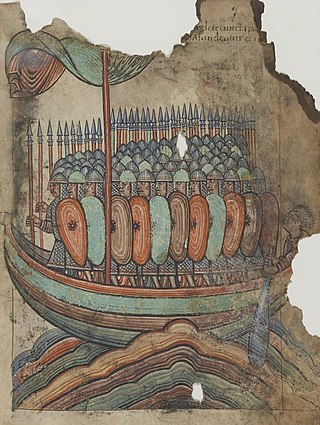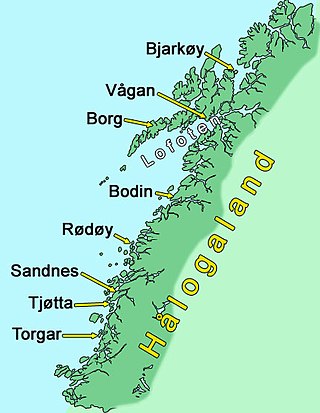Fictional characters
- Dagny, Ørnulv's daughter, fictional character in The Vikings of Helgeland
- Dagny Taggart, fictional character in Ayn Rand's Atlas Shrugged
Dagny is a Scandinavian feminine given name of Norwegian origin. Alternate forms include Dagna, Dagne and the Latvian form Dagnija.
It is derived from the combination of the Old Norse words dagr 'day' and ný 'new'. While appearing in Norse mythology, it had virtually fallen out of use for centuries, and was revived at the second half of the 19th century. This is attributed either to a character of that name in Henrik Ibsen’s 1857 play "The Vikings of Helgeland" or more likely to the popularity of Dagny , a Scandinavian women's magazine founded in 1886. The name was at its most common in Scandinavia in the early to mid 20th century.
Notable people with the name include:

Scandinavia is a subregion of Northern Europe, with strong historical, cultural, and linguistic ties between its constituent peoples. Scandinavia most commonly refers to Denmark, Norway, and Sweden. It can sometimes also refer to the Scandinavian Peninsula. In English usage, Scandinavia is sometimes used as a synonym for Nordic countries. Iceland and the Faroe Islands are sometimes included in Scandinavia for their ethnolinguistic relations with Sweden, Norway and Denmark. While Finland differs from other Nordic countries in this respect, some authors call it Scandinavian due to its economic and cultural similarities.

The Viking Age was the period during the Middle Ages when Norsemen known as Vikings undertook large-scale raiding, colonising, conquest, and trading throughout Europe and reached North America. The Viking Age applies not only to their homeland of Scandinavia but also to any place significantly settled by Scandinavians during the period. The Scandinavians of the Viking Age are often referred to as Vikings as well as Norsemen, although few of them were Vikings in the sense of being engaged in piracy.

Vikings were seafaring people originally from Scandinavia, who from the late 8th to the late 11th centuries raided, pirated, traded, and settled throughout parts of Europe. They also voyaged as far as the Mediterranean, North Africa, the Middle East, Greenland, and Vinland. In their countries of origin, and some of the countries they raided and settled in, this period is popularly known as the Viking Age, and the term "Viking" also commonly includes the inhabitants of the Scandinavian homelands as a whole. The Vikings had a profound impact on the early medieval history of northern and Eastern Europe, including the political and social development of England and parts of France, and established the embryo of Russia in Kievan Rus'.

The Norsemen were a North Germanic linguistic group of the Early Middle Ages, during which they spoke the Old Norse language. The language belongs to the North Germanic branch of the Indo-European languages and is the predecessor of the modern Germanic languages of Scandinavia. During the late eighth century, Scandinavians embarked on a large-scale expansion in all directions, giving rise to the Viking Age. In English-language scholarship since the 19th century, Norse seafaring traders, settlers and warriors have commonly been referred to as Vikings.
Astrid is a given name of Scandinavian origin, a modern form of the name Ástríðr. Derived from the Old Norse Ássfriðr, a compound name composed of the elements áss and fríðr.
Nordic folklore is the folklore of Denmark, Norway, Sweden, Iceland and the Faroe Islands. It has common roots with, and has been under mutual influence with, folklore in England, Germany, the Low Countries, the Baltic countries, Finland and Sápmi. Folklore is a concept encompassing expressive traditions of a particular culture or group. The peoples of Scandinavia are heterogenous, as are the oral genres and material culture that has been common in their lands. However, there are some commonalities across Scandinavian folkloric traditions, among them a common ground in elements from Norse mythology as well as Christian conceptions of the world.
Helga is a female name, used mainly in Scandinavia, German-speaking countries and the Low Countries. The name was in use in England before the Norman Conquest, but appears to have died out afterwards. It was re-introduced to English-speaking nations in the 20th century from Germany, the Netherlands, and the Nordic countries. Scandinavian male equivalent is Helge, or Helgi. Eastern Slavic names Olga (Ольга) and Oleg (Олег) are derived from it.

Hålogaland was the northernmost of the Norwegian provinces in the medieval Norse sagas. In the early Viking Age, before Harald Fairhair, Hålogaland was a kingdom extending between the Namdalen valley in Trøndelag county and the Lyngen fjord in Troms county.
The Younger Futhark, also called Scandinavian runes, is a runic alphabet and a reduced form of the Elder Futhark, with only 16 characters, in use from about the 9th century, after a "transitional period" during the 7th and 8th centuries. The reduction happened at the same time as phonetic changes that led to a greater number of different phonemes in the spoken language, when Proto-Norse evolved into Old Norse. Also, the writing custom avoided carving the same rune consecutively for the same sound, so the spoken distinction between long and short vowels was lost in writing. Thus, the language included distinct sounds and minimal pairs that were written the same.
Signe or Signy is a feminine given name used in the Nordic and Baltic countries, derived from Old Norse sigr (victory) and nýr (new), which may refer to:
Ragnar is a masculine Germanic given name, composed of the Old Norse elements ragin- "counsel" and hari- "army".
The Vikings at Helgeland is Henrik Ibsen's seventh play. It was written during 1857 and first performed at Christiania Norske Theater in Oslo on 24 November 1858. The plot takes place during the time of Erik Blood-axe in the north of Norway in historic Helgeland, a time in which Norwegian society was adjusting from the tradition of Old Norse Sagas to the new era of Christianity. It concerns the arrival of Ornulf, who with his seven sons is seeking his daughter, Dagny, and foster-daughter, Hjordis, who were abducted and married by Sigurd and Gunnar, respectively. Tragedy compounded by conceptions of honour and duty lead to the deaths of all of Ornulf's sons, Sigurd, and Hjordis. The plot is reminiscent of the Germanic myth of Sigmund and Brynhilde.
Sven is a Scandinavian masculine first name. In Old Norse the meaning was "young man" or "servant" and the original Old Norse spelling was sveinn.
Ivar is a Scandinavian masculine given name. Another variant of the name is Iver, which is more common in Norway. The Old Norse name has several possible etymologies. In North Germanic phonology, several of the elements common to Germanic names became homophonous. The first element Ívarr may contain yr "yew" and -arr, but it may have become partly conflated with Ingvar, and possibly Joar. The second element -arr may alternatively also be from geir "spear" or it may be var "protector". The name was adopted into English as Ivor, into Gaelic as Ìomhar, into Estonian as Aivar or Aivo and into Latvian as Ivars.
The name Ingvar is an Old Norse first name for men common in Scandinavia meaning "protected by Yngvi". The feminine version of the name is Inga.
Solveig is a female given name of Old Norse origin. It is most common in Denmark, Norway, Sweden, and Iceland, and it is also somewhat common in Germany and France.
Torbjörn, Thorbjörn, Torbjørn, or Thorbjørn are modern Swedish, Norwegian and Danish forms of the Old Norse and Icelandic name Þorbjörn, meaning thunder and bear.
Thorsten is a Scandinavian given name. The Old Norse name was Þórsteinn. It is a compound of the theonym Þór (Thor) and steinn "stone", which became Thor and sten in Old Danish and Old Swedish.
North Germanic peoples, Nordic peoples and in a medieval context Norsemen, were a Germanic linguistic group originating from the Scandinavian Peninsula. They are identified by their cultural similarities, common ancestry and common use of the Proto-Norse language from around 200 AD, a language that around 800 AD became the Old Norse language, which in turn later became the North Germanic languages of today.
Sigurd or Sigur is a Scandinavian male name used in Norway, Denmark, Sweden, and Iceland derived from the Old Norse Sigurðr. Other forms of this name are Sigvard and Siward. A short form of the name is Sjur.